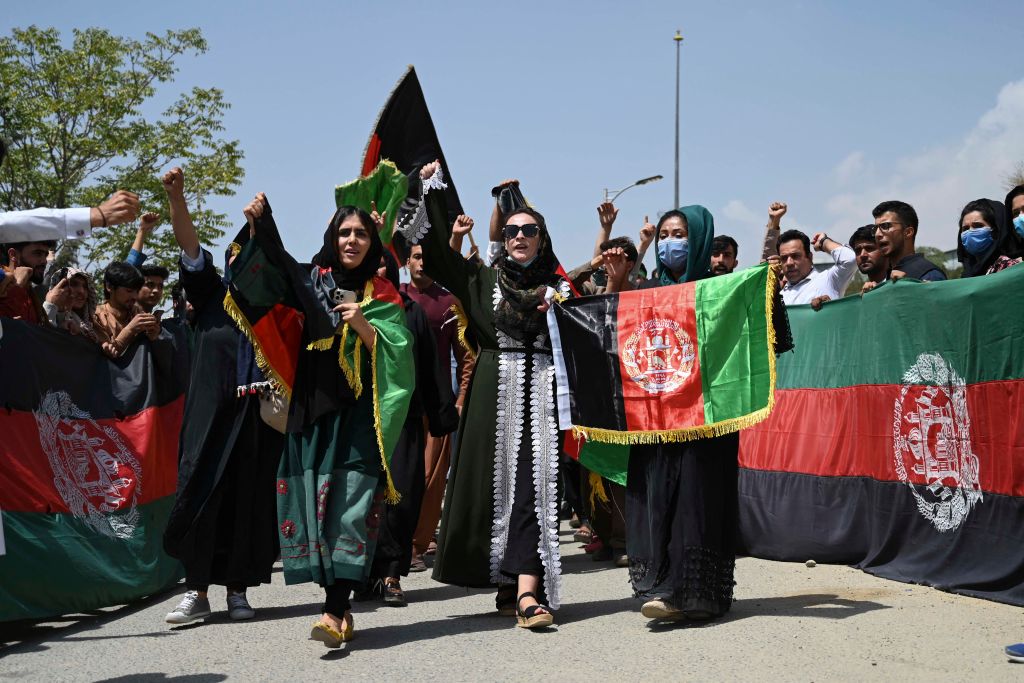Taliban finds it isn't so easy to set up its non-'democratic' Afghan government based on Sharia law


A free daily email with the biggest news stories of the day – and the best features from TheWeek.com
You are now subscribed
Your newsletter sign-up was successful
"Over the course of more than two decades, the Taliban proved that they knew how to wage an insurgency" in Afghanistan, The New York Times reports Thursday. "Over the last five days, ominous signs have emerged that they have yet to learn how to run a country." The Taliban marked Afghanistan's Independence Day on Thursday, a celebration of the country's liberation from British rule in 1919, by cheering their successful "jihadi resistance" against "another arrogant power of the world, the United States."
But protests against Taliban rule that broke out Wednesday in Jalalabad and Khost province, violently suppressed by Taliban forces, spread to Kabul on Thursday, including near the presidential palace. Some opposition figures are converging in the last holdout, the Panjshir Valley, with an eye to reviving the anti-Taliban Northern Alliance for armed resistance.
"With many ATMs out of cash and worries about rising food prices in this nation of 38 million people reliant on imports, the Taliban face all the challenges of the civilian government they dethroned without the level of international aid it enjoyed," The Associated Press reports. The Taliban has so far been unable to access Afghanistan's $9 billion in foreign reserves, most of it effectively frozen by the U.S., and International Monetary Fund aid and development money are off-limits at least until Afghanistan has a new government. The Taliban does have revenue from mining, customs taxes, and narcotics smuggling, The Wall Street Journal reports.
The Week
Escape your echo chamber. Get the facts behind the news, plus analysis from multiple perspectives.

Sign up for The Week's Free Newsletters
From our morning news briefing to a weekly Good News Newsletter, get the best of The Week delivered directly to your inbox.
From our morning news briefing to a weekly Good News Newsletter, get the best of The Week delivered directly to your inbox.
Waheedullah Hashimi, a high-ranking Taliban commander, tells Reuters that Afghanistan will probably be governed by a ruling council that answers to Haibatullah Akhundzada, the Taliban's supreme leader. Taliban leadership will meet to discuss the new government later this week, he added, but "there will be no democratic system at all because it does not have any base in our country," and the new political system "is clear: It is Sharia law and that is it." That system would be similar to the one the Taliban employed when it last ruled Afghanistan, from 1996 to 2001.
A different Taliban leader told Afghan reporters Tuesday that women will have more rights this time around, including access to jobs and education, but Hashimi told Reuters that "our [scholars] will decide whether girls are allowed to go to school or not" and "whether they should wear hijab, burqa, or only [a] veil plus abaya or something, or not. That is up to them."
A free daily email with the biggest news stories of the day – and the best features from TheWeek.com
Peter has worked as a news and culture writer and editor at The Week since the site's launch in 2008. He covers politics, world affairs, religion and cultural currents. His journalism career began as a copy editor at a financial newswire and has included editorial positions at The New York Times Magazine, Facts on File, and Oregon State University.
-
 Why is the Trump administration talking about ‘Western civilization’?
Why is the Trump administration talking about ‘Western civilization’?Talking Points Rubio says Europe, US bonded by religion and ancestry
-
 Quentin Deranque: a student’s death energizes the French far right
Quentin Deranque: a student’s death energizes the French far rightIN THE SPOTLIGHT Reactions to the violent killing of an ultraconservative activist offer a glimpse at the culture wars roiling France ahead of next year’s elections
-
 Secured vs. unsecured loans: how do they differ and which is better?
Secured vs. unsecured loans: how do they differ and which is better?the explainer They are distinguished by the level of risk and the inclusion of collateral
-
 Operation Rubific: the government's secret Afghan relocation scheme
Operation Rubific: the government's secret Afghan relocation schemeThe Explainer Massive data leak a 'national embarrassment' that has ended up costing taxpayer billions
-
 British warship repels 'largest Houthi attack to date' in the Red Sea
British warship repels 'largest Houthi attack to date' in the Red SeaSpeed read Western allies warn of military response to Iranian-backed Yemeni rebels if attacks on ships continue
-
 Houthi rebels claim Red Sea ship attacks
Houthi rebels claim Red Sea ship attacksspeed read Iran-backed Yemeni group vows to escalate aggression towards Israel-linked vessels in revenge for Gaza war
-
 Israel plans next phase of Gaza war as first hostages released
Israel plans next phase of Gaza war as first hostages releasedSpeed read After four-day ceasefire 'we will not stop' until destruction of Hamas, says Israel
-
 Mob storms Russian airport 'looking for Jews'
Mob storms Russian airport 'looking for Jews'Speed Read Plane from Israel surrounded by rioters chanting antisemitic slogans after landing in Russia's Dagestan region
-
 Tuberville's military promotions block is upending lives, combat readiness, 3 military branch chiefs say
Tuberville's military promotions block is upending lives, combat readiness, 3 military branch chiefs saySpeed Read
-
 Ukraine's counteroffensive is making incremental gains. Does it matter in the broader war?
Ukraine's counteroffensive is making incremental gains. Does it matter in the broader war?Speed Read
-
 US commissions first-ever Navy ship in a foreign port
US commissions first-ever Navy ship in a foreign portSpeed Read
